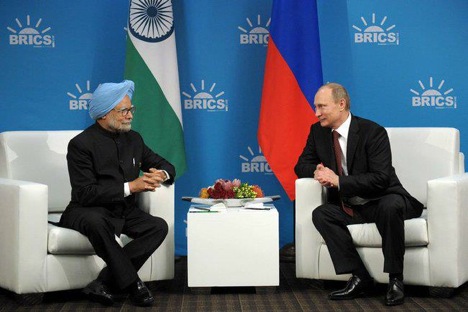What made India’s prime minister happy

Vladimir Putin meets Manmohan Singh on the sidelines of the BRICS Summit in Durban. Source: Indian PMO
The Indian Prime Minister Manmohan Singh’s journey home from visits abroad always provides a moveable feast. Those are rare occasions when the notoriously taciturn prime minister opens up to the media persons accompanying him – with ample time in his hands, willing to share thoughts, shedding his innate reserve for an hour. The journey back home from Durban, South Africa, on Thursday was of a piece, no doubt.
What made the prime minister so relaxed? He was a harrowed man when he left India’s shores. Italian Marines, Sri Lankan Tamil problem, rowdyish coalition partners, faltering economy, dysfunctional parliament – crisis situations were galore.
Was it the BRICS summit? Or, was it the successful first meeting he had on Wednesday in Durban with China’s new leader Xi Jinping? But the BRICS development bank or the India-China relations are after all work in progress. There must be a third reason – and it concerns the domestic political scene in India.
After a prolonged period of political uncertainty buffeting the Manmohan Singh government, the ruling Congress Party is finally getting its act together. By deft manoeuvring, the party has all but ensured that in a huge swathe of the north Indian plains – comprising the states of Uttar Pradesh, Bihar and West Bengal – the main opposition Bharatiya Janata Party [BJP] is going to be virtually deprived of an electoral ally in the 2014 parliamentary poll and may come to bite dust.
The Congress Party’s success has been so encouraging that it is all but pushing away the main regional party from Uttar Pradesh, Samajwadi Party [SP], estimating that it pays instead to align with the Bahujana Samaj Party [BSP], which is a rival to the SP, taking into account the prevailing political climate in Uttar Pradesh. The Congress rightly estimates that it can pick and choose, since the SP has nowhere to go anyway but isolation, because it depends on Muslim voters’ support and aligning with the Hindu nationalist BJP would be suicidal politically.
In Bihar, on the other hand, Congress is on the brink of virtually nabbing the Janata Dal (U), another regional party, which used to be the BJP’s key ally and steady partner in the government ruling the state up until recently. The BJP might get stranded without an ally in Bihar and it cannot give a credible performance in the poll without JD (U) backing. Similarly, in West Bengal, a new proximity is developing with Trinamool Congress, the ruling party in the state, which used to be Congress Party’s ally until recently. Again, Trinamool, like the SP in Uttar Pradesh, also has to keep its Muslim vote bank appeased, which means keeping the BJP at bay.
Now, these three states alone account for one third of the 540-member Indian parliament. To add to BJP’s woes, in the southern state of Karnataka, where it has been in power for the past 5 years, it is almost certain that Congress will defeat it in the forthcoming assembly elections due shortly. Which means that in something like 125 seats from the four southern states – Andhra Pradesh, Karnataka, Tamil Nadu and Kerala – put together, BJP will be lucky if it manages to garner a dozen seats at the most.
Clearly, this being the state of affairs all in all in the seven states that return around 300 lawmakers to the 540-member Indian parliament, BJP’s prospects of coming to power in Delhi in 2014 seem rather dismal as things stand today.
The big question is when the parliamentary elections are going to be held. The due date comes a year hence, but, as things stand, Congress may feel tempted to go for early poll, especially if it trounces the BJP convincingly in the May elections in Karnataka. The temptation will always be there to deny the BJP the time to regain its poise after a shattering defeat, settle its internal disarray and unify solidly behind a single leader.
Meanwhile, although the prime minister keeps talking about ‘reforms’, the high likelihood is that the government will resort to populist measures aimed at projecting the Congress Party as a caring, benevolent party that safeguards the interests of the hundreds of millions of poor people who form the majority of India’s population. Congress Party is already pressing the pedal on welfare measures with the eye on the forthcoming election.
Manmohan Singh told the media on Thursday with supreme confidence that the coalition government he leads is no more in any trouble. His confidence in being in control is such that although 80 years old, Manmohan Singh insists he still keeps an open mind as regards his own political career when the current term as prime minister ends. Indeed, you don’t wrap up all things for all time in politics, but you can most things for some time. This is one such moment when things look good, and it makes the prime minister happy.
All rights reserved by Rossiyskaya Gazeta.
Subscribe
to our newsletter!
Get the week's best stories straight to your inbox